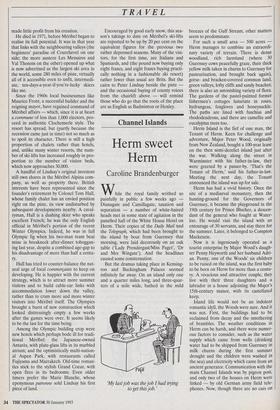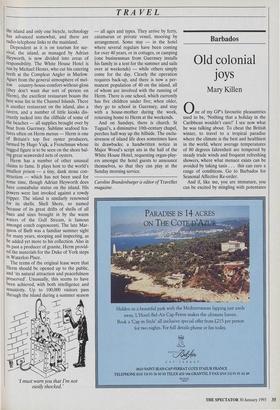Channel Islands
Herm sweet Herm
Caroline Branclenburger
While the royal family writhed so painfully in public a few weeks ago — Dianagate and Camillagate, taxation and separation — a number of white-haired heads met in some state of agitation in the panelled hall of the White House Hotel on Herm. Their copies of the Daily Mail and the Telegraph, which had been brought to the island by boat from Guernsey that morning, were laid decorously on an oak table (`Lady Prendergast/Miss Paget', 'Dr and Mrs Wingate'). And the headlines caused some consternation.
But the dramas taking place in Kensing- ton and Buckingham Palaces seemed infinitely far away. On an island only one and a quarter miles long, and three-quar- ters of a mile wide, bathed in the mild
`My last job was the job I had trying to get this job.'
breezes of the Gulf Stream, other matters seem to predominate.
For such a small area — 500 acres Herm manages to combine an extraordi- nary variety of terrain. There is dense woodland, rich farmland (where 30 Guernsey cows peacefully graze, their thick yellow milk taken in churns to Guernsey for pasteurisation, and brought back again), gorse- and bracken-covered common land, green valleys, lofty cliffs and sandy beaches; there is also an astonishing variety of flora. The gardens of the pastel-painted former fishermen's cottages luxuriate in roses, hydrangeas, foxgloves and honeysuckle. The paths are lined with fuschias and rhododendrons, and there are camellia and eucalyptus trees too.
Herm Island is the fief of one man, the Tenant of Herm. Keen for challenge and adventure, Major Peter Wood, originally from New Zealand, bought a 100-year lease on the then semi-derelict island just after the war. Walking along the street in Warminster with his father-in-law, they were greeted by a passer-by. 'That's the Tenant of Herm,' said his father-in-law. Meeting the next day, the Tenant announced the island was up for sale.
Herm has had a vivid history. Once the site of a mediaeval monastery, then the hunting-ground for the Governors of Guernsey, it became the playground in the 19th century for Prince Blucher, a descen- dant of the general who fought at Water- loo. He would visit the island with an entourage of 30 servants, and stay there for the summer. Later, it belonged to Compton Mackenzie.
Now it is ingeniously operated as a tourist enterprise by Major Wood's daugh- ter Penny Heyworth and her husband Adri- an. Penny, one of the Woods' six children to be raised on the island, was the first baby to be born on Herm for more than a centu- ry. A vivacious and attractive couple, they live with their three daughters and a labrador in a house adjoining the Major's 15th-century manor, with its castellated keep.
Island life would not be an indolent romantic idyll, the Woods were sure. And it was not. First, the buildings had to be reclaimed from decay and the smothering of brambles. The weather conditions in Herm can be harsh, and there were numer- ous factors to consider, such as the water supply which came from wells (drinking water had to be shipped from Guernsey in milk churns during the first summer drought and the children were washed in the sea) and electricity which came from an ancient generator. Communication with the main Channel Islands was by pigeon post, and only two of the houses on Herm were linked — by old German army field tele- phones. Now, though there are no cars on
the island and only one bicycle, technology has advanced somewhat, and there are radio-telephone links to the mainland.
Dependent as it is on tourism for sur- vival, the island, as managed by Adrian Heyworth, is now divided into areas of responsibility. The White House Hotel is run by Michael Hester, who cut his catering teeth at the Compleat Angler in Marlow. Apart from the general atmosphere of mel- low country-house-comfort-without-gloss (they don't want that sort of person on Herm), the excellent restaurant boasts the best wine list in the Channel Islands. There Is another restaurant on the island, also a tavern, and a number of little kiosks dis- creetly tucked into the cliffside of some of the beaches — all supplies brought over by boat from Guernsey. Sublime seafood fea- tures often on Herm menus — Herm is one of Britain's top five oyster producers, farmed by Hugo Vajk, a Frenchman whose logged figure is to be seen on the shore bal- ing great seaweeded nets of oysters.
Herm has a number of other unusual claims to fame. It plays host to the world's smallest prison — a tiny, dank stone con- struction — which has not been used for some time, though Adrian Heyworth does have constabular status on the island. His powers were last invoked against a rowdy tripper. The island is similarly renowned for its shells. Shell Shore, so named because of its great drifts of shells of all hues and sizes brought in by the warm Waters of the Gulf Stream, is famous amongst conch cognoscenti. The late Mar- quess of Bath was a familiar summer sight for many years, stooping and inspecting, as he added yet more to his collection. Also in its past a producer of granite, Herm provid- ed the materials for the Duke of York steps in Waterloo Place.
The terms of the original lease were that Herm should be opened up to the public, and 'its natural attraction and peacefulness Preserved'. Unusually, this seems to have been achieved, with both intelligence and sensitivity. Up to 100,000 visitors pass through the island during a summer season
must warn you that I'm not easily shocked.'
— all ages and types. They arrive by ferry, catamaran or private vessel, mooring by arrangement. Some stay — in the hotel where several regulars have been coming for over 40 years, or in cottages, or camping (one businessman from Guernsey installs his family in a tent for the summer and sails over at weekends) — while others simply come for the day. Clearly the operation requires back-up, and there is now a per- manent population of 40 on the island, all of whom are involved with the running of Herm. There is one school, which currently has five children under five; when older, they go to school in Guernsey, and stay with a house-mother during the week, returning home to Herm at the weekends.
And on Sundays, there is church. St Tugual's, a diminutive 10th-century chapel, perches half-way up the hillside. The exclu- siveness of island life does sometimes have its drawbacks; a handwritten notice in. Major Wood's script sits in the hall of the White House Hotel, requesting organ-play- ers amongst the hotel guests to announce themselves, so that they can play at the Sunday morning service.
Caroline Brandenburger is editor of Traveller magazine.











































































 Previous page
Previous page